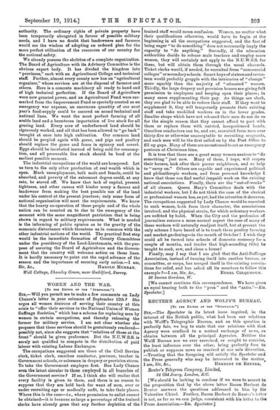WOMEN AND THE WAR.
[TO THE EDITOR Or THE " BrEcTATOR."1 Sin,—Will you permit me to make a few comments on Lady Chance's letter in your columns of September 12th P She urges all women desirous of serving their country at this crisis to "offer their services to the National Union of Woman Suffrage Societies," which has a scheme for replacing men by women in certain occupations, and thereby releasing the former for military service. I am not clear whether she proposes that these services should be gratuitously rendered— possibly not, since she suggests that "relatives of those at the front" should be given preference. But the N.U.W.S.S. is surely not qualified to compete in the distribution of paid labour with existing Labour Exchanges.
The occupations suggested are those of the Civil Service clerk, ticket clerk, omnibus conductor, postman, teacher in Government schools, or salesman in drapery or provision stores. To take the Government employee first. Has Lady Chance seen the latest circular to those employed in all branches of the Government service P If so, I think she will realize that every facility is given to them, and there is no reason to suppose that they are held back for want of men, over or under recruiting age or medically unfit, to take their places. Where this is the case—i.e., where permission to enlist cannot be obtained—it is because so large a percentage of the trained clerks have already gone that any further depletion of the
trained staff would mean confusion. Women, no matter what their qualifications otherwise, would have to begin at the beginning in all the occupations suggested, and the fact of being eager " to do something" does not necessarily imply the capacity to "do anything." Secondly, if the education authorities decide to release male teachers and employ more women, they will certainly not apply to the N.U.W.S.S. for these, but will obtain them through the usual channels. Ticket clerks would, if needed, be recruited from "commercial colleges" or secondary schools. Smart boys of sixteen and seven- teen would probably grapple with the intricacies of "change" more equably than the majority of " educated " women. Thirdly, the large drapery and provision houses are giving full permission to employees and keeping open their places ; in many cases supplementing their pay. As things are slack, they are glad to be able to reduce their staff. If they want to supplement it, they will temporarily promote their existing staff and take unskilled workers on in the lower grades. Smaller shops which have not released their men do not do so for the simple reason that they cannot afford to part with them or replace them with untried, inexperienced hands. Omnibus conductors can be, and are, recruited from men over thirty-five or otherwise unacceptable to recruiting sergeants, and such men will be the first called on by the Post Office to fill up gaps. Many of them are accustomed to act as emergency postmen at Christmas time.
It is true that there are a great many women anxious to "do something" just now. Many of them, I hope, will reopen their houses, look after their poorer neighbours, and so help to "carry on." Others are capable and experienced political and philanthropic workers, and from personal knowledge I know that these can find useful (unpaid) work on the existing national associations. Finally, there are the " out-of-works " of all classes. Queen Mary's Committee deals with the industrial workers, but I do not think the case of the clerical or professional women has, as yet, had the attention it deserves. The occupations suggested by Lady Chance would be unsuited to such women, both from their character, the associations involved, and the physical strain, for which sedentary worker% are unfitted by habit. When the City and the profession of journalism resume a more normal aspect the case of many of these workers will naturally readjust itself, but at present the only scheme I have heard of is to teach them poultry farming and market gardening—in the month of October ! I wish they could all be turned into schools of domestic economy for a. couple of months, and (under that high-sounding title) be taught to cook, sew, and clean a house!
Finally, may I say that I am glad that the Anti-Suffrage Association, instead of turning itself into another bureau, or committee, or corps, has merged itself in the existing associa- tions for relief, and has asked all its members to follow this [We cannot continue this correspondence. We have given an equal hearing both to the " pros " and the "antis."—ED. Spectator.]


































 Previous page
Previous page